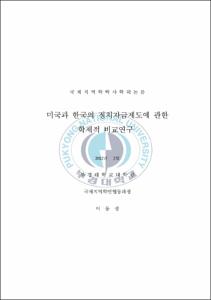미국과 한국의 정치자금제도에 관한 학제적 비교연구
- Alternative Title
- Interdisciplinary Study on Comparison of Political Funds System between Korea and the U.S.
- Abstract
- ABSTRACT
Interdisciplinary Study on Comparison of Political Funds System between Korea and the U.S.
Dong-sung Lee
Department of Area Studies
Graduate School of
Pukyong National University
There are so many different political funds system in the world. Because each country seek for an different value of democracy. So the democratic values have influenced on the system of political financing. Therefore The system of political financing should be designed and founded on the democratic values that people pursue. However, there is a controversy on which democratic value might be taken precedence of. Diverse democratic values sometimes go along, but on the other creates tension. To consolidate and vitalize democracy we should pay a great attention on these conflict and design democratic institution with consideration of there congruence. There are four pairs of contrasting democratic values; market vs state, stability and diversity, trustee and delegation, and party-centered politics vs candidate-centered politics. The U.S. have sought for the market-centered value of democracy, political stability and candidate-centered politics. But Korea have sought for state-centered value of democracy, political diversity and party-centered politics. So Political financing system in Korea is one of example of showing disharmony among political institutions. Even though it develops the state-funding and stability-pursing and delegation-oriented political system, the political financing system evolve into the candidate-centered system.
When we have studied political funding system in the U.S., we will find that the development of political funding system in the U.S. have focused on the regulation of soft money. In the U.S. federal election laws were enacted in 1971 to regulate all funds which might be considered federal election related. Although election campaign funding system has been institutionalized on the basis of American political culture, debates on the way how to regulate campaign funds has always been hot. The soft money has been a critical issue for last thirty years.
In case of Korea, Campaign Fund Law had been enacted in 1956 at first. After then Campaign Fund Law of Korea have been revised so many times. The political equality has been a focus in Korea politics after revealing a cozy relationship between corporations and politicians. Compared with the findings in the studies in the U.S., this study attempts to evaluate the possible consequences of campaign finance regulations in Korea, which have beeb revised on March 12, 2004. This study suggests, first, that it will be very difficult to achieve the intended transparency in campaign disclosure with current regulation. Therefore, it suggests that campaign contributors information should be data-based on the Internet after abolishing the clause which prohibits from listing contributors information on the net. Second, current contribution limits, which are known to reduce the influence of "fat cats" and encourage citizen participation, should remain to be in place. However, the clauses, which limit the amount of contributions that a candidate committee can raise and which prohibits the committee from raising contributions by holding an public event should be abolished so that citizen participation are further facilitated. finally, this study suggests that campaign spending limits should be in place as it is, because campaign spending is less likely to reduce political knowledge and to benefit incumbents at the expense of challengers.
On the other hand, th political culture of Korea is very different from that of the U.S. According to Hofstede's, Hall's and Tromoenaars & Turner's study, Korea have a different cultural dimensions. For example, Hofsted's five cultural dimension are individualism, power distance, uncertainty avoidance, masculinity, and long-term orientation. Korea's cultural dimension are the collectivism, high power distance, low masculinity, high uncertainty avoidance and long-term orientation. But the U.S., is not same as Korea's. These difference can make a different political culture. And the different political culture make a different political fund system between Korea and the U.S. Therefore, Koreans studies on political culture should focus more on the particular and unique natures of Korean political behaviors and political structures.
- Issued Date
- 2012
- Awarded Date
- 2012. 2
- Type
- Dissertation
- Publisher
- 부경대학교 대학원 국제지역학연협과정
- Affiliation
- 부경대학교 대학원 국제지역협동과정
- Department
- 대학원 국제지역ㆍ통상학학ㆍ연협동과정
- Advisor
- 이홍종
- Table Of Contents
- 제1장 서 론 1
제1절 연구의 목적 1
제2절 연구 방법 및 범위 4
1. 학제적 연구의 필요성 4
2. 연구의 방법 및 범위 9
제2장 정당, 선거, 및 정치자금제도의 이론적 고찰 12
제1절 정당 및 선거제도의 이론적 고찰 12
제2절 정치자금제도의 이론적 고찰 36
1. 정치자금의 의의 36
2. 정당의 정치자금 조달 모델 40
3. 정치자금 규제의 필요성 43
4. 정치자금제도의 이론적 접근 46
제3장 미국과 한국의 정치자금제도 분석 51
제1절 미국의 정치자금제도 분석 51
1. 미국의 정치자금제도 51
2. 미국정치자금규제의 변천과정 55
3. 미국의 정치자금조성 89
4. 미국 정치자금제도의 문제점 119
제2절 한국의 정치자금제도 분석 121
1. 한국의 정치자금제도 121
2. 정치자금법의 제개정 과정 133
3. 한국의 정치자금 조성 147
4. 정치자금 규제의 법적 근거 167
제4장 미국과 한국의 정치자금제도에 관한 학제적 비교 171
제1절 양국의 정치자금제도 비교 171
1. 정치자금의 개념 및 유형 171
2. 미국과 한국의 민주주의 가치 비교 172
3. 정치자금관련 법제의 제정 및 개정 176
4. 정치자금조성방법 178
5. 정치자금의 수입규제 187
6. 정치자금 지출 규제 188
7. 정치자금 투명성 규정 189
제2절 양국 정치자금제도 차이점의 학제적 연구 190
1. 역사적 환경의 차이 190
2. 국민의 가치관의 차이 194
3. 문화의 차이 198
4. 종교적 다양성 및 지리적인적 구성의 차이 212
제3절 한국 정치자금제도의 문제점과 개선방안 214
1. 한국 정치자금제도의 문제점 214
2. 한국 정치자금제도의 개선방안 227
제5장 결론 236
- Degree
- Doctor
- Appears in Collections:
- 대학원 > 국제지역통상학학연협동과정
- Files in This Item:
-
-
Download
 미국과 한국의 정치자금제도에 관한 학제적 비교연구.pdf
기타 데이터 / 1.78 MB / Adobe PDF
미국과 한국의 정치자금제도에 관한 학제적 비교연구.pdf
기타 데이터 / 1.78 MB / Adobe PDF
-
Items in Repository are protected by copyright, with all rights reserved, unless otherwise indicated.